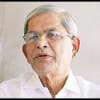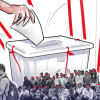BNP high-ups were in dark
Khaleda Zia's new government model, unveiled at the BNP's council on Saturday, took many of her party's policymakers by surprise as they claimed to have been kept in the dark about it until its disclosure.
If voted to power, Khaleda proposed, the BNP will ensure a balance of power in the executive branch of the government by reducing absolute power of the prime minister, introduce bicameral parliament and public hearing for appointments to constitutional bodies.
But the proposals were never discussed at the party's highest policymaking body -- national standing committee -- before the council, BNP sources said.
The 19-member standing committee held its last meeting on Thursday with Khaleda in the chair at her Gulshan office. There, the committee endorsed some changes to the party charter.
But there were no discussions about the proposals on the new government model, confirmed a number of committee members who attended the meeting.
This contradicts the BNP's constitution that empowers the standing committee to work as the party's main policymaking forum and to decide the party's policies and programmes.
"The proposals are new policies and programmes of our party ... Major policies, in fact ... But unveiling them bypassing the standing committee is against the spirit of BNP's charter," a member of the now defunct standing committee told The Daily Star yesterday, wishing anonymity.
After Khaleda unveiled the proposals in her address to the inaugural session of the council, a veteran BNP leader, who was a member of the standing committee dissolved through the council, asked one of his party colleagues if he knew about it in advance.
"He replied in the negative and said, 'Do you think the standing committee is considered worthy of discussing those?' It was too surprising for us," the leader said.
"The proposals should have been discussed by the standing committee beforehand," he added.
However, Khandaker Mosharraf Hossain, who too was a member of the BNP's apex policymaking forum, said it was not possible to discuss the proposals among the committee members.
"Our chairperson unveiled the proposals at the council. We in principle endorsed them," he said yesterday, adding: "All the proposals will be discussed before they are finalised."
Pro-BNP intellectual Prof Emajuddin Ahmed was involved in drafting the proposals on the new government model.
Asked how the BNP would implement the proposals, the former Dhaka University vice-chancellor said it would only be possible to go ahead with the proposals if the party wins an election with two-thirds majority in parliament.
"At this stage the BNP can do nothing more than this," said Prof Emajuddin, one of the country's leading political scientists.
To implement the proposals, the constitution will have to be amended. And two-thirds majority in parliament is required to amend the constitution.
Mosharraf, on the other hand, said a group of professionals, politicians and experts are still working on the proposals.
"The BNP chief will soon explain before the nation how the proposals will be implemented," he added.
However, the way the proposals were unveiled raised questions over the effectiveness and sincerity behind those.
In the afternoon, Khaleda in her address spoke against absolute power of the prime minister and advocated democracy.
But at night, she was vested with the absolute authority to pick party leadership to form the national executive and the standing committees, ignoring the party charter that empowers councillors to elect the leadership.
Now Khaleda and her elder son Tarique Rahman -- who were elected chairperson and senior vice-chairman respectively without a challenge -- are the only office bearers of the party.
With empowerment of Khaleda by the council to pick other leaders, the national executive and the standing committees were automatically dissolved.
All power of the party now belongs to Khaleda. In her absence, Tarique can exercise the power until the two crucial bodies are formed.
A number of BNP leaders yesterday said Khaleda may take two to three weeks to complete the formation of the two committees.
Many in the BNP are now trying to win Khaleda's heart to get berths in the two key party forums, party insiders said.

 For all latest news, follow The Daily Star's Google News channel.
For all latest news, follow The Daily Star's Google News channel. 








Comments